副業是在香港中文大學教書,主業是玩貓。
Summer in Hong Kong: Misunderstandings and Truths
Today, Hong Kong will usher in the largest Hong Kong-wide general strike in nearly 50 years. According to the latest news, half of the flights at Hong Kong Airport will be cancelled due to the collective absence of air traffic controllers. At the same time, various protests are becoming more and more intensive and fierce. For readers who do not know the ins and outs of the incident, it is easy to superficially understand and evaluate the entire movement, blaming the demonstrators for destroying the peace. Recently, in mainland China, there have been various criticisms of this movement. Unfortunately, they are all serious misuse of gods. If these criticisms are just out of the ignorance of individual netizens, they can still be barely understood. But if the central government also understands this movement from this perspective, it will bring disaster to the country and the people.
The Nothingness of "Economics"
The first type of misunderstanding is what I call "Economics." This statement usually comes in two ways. The first way is to say that Hong Kong's economy is stagnant, and young people feel that there is no way forward, so they join the resistance movement; Hong Kong's economy will only get worse, and young people will become even more hopeless. These two statements can be described as two sides of the same coin, both of which are economic arguments to understand the origin and consequences of the movement.
What are the facts? Let's take a look at the polls during both campaigns.
The first survey came from a telephone poll conducted by the Hong Kong Public Opinion Research Institute in mid-July. It successfully interviewed 1,002 Hong Kong citizens. At the 95% confidence level, the error did not exceed +/-4%. First, they found that only 21% of citizens supported Carrie Lam as chief executive, a record low. This first explains the macro background of the movement: it is definitely not caused by a small group of young people being instigated by some external force, but the overwhelming majority of Hong Kong citizens are completely disappointed with the government.
So why are the citizens disappointed? The survey asked respondents to rate their satisfaction with regard to economic conditions, people's livelihood conditions, and political conditions. Compared with the same survey in February before the outbreak of the movement, the net satisfaction of economic conditions dropped from -1% to -18%, the satisfaction of people's livelihood dropped from -31% to -43%, and the net satisfaction of political conditions dropped from - 44% dropped to -82%. From these three sets of data, it can be seen that although Hong Kong people are dissatisfied with the economic situation in Hong Kong, they are far less dissatisfied with the political situation. At the same time, the outbursts of popular grievances over the past few months have largely been political rather than economic. In this case, some pro-government political leaders have recently said that they want to alleviate public anger by improving people's livelihood or even directly sending money, but it is foreseeable that it will be completely ineffective. Public anger clearly points to a political issue, and this source has to be dealt with to relieve public anger.
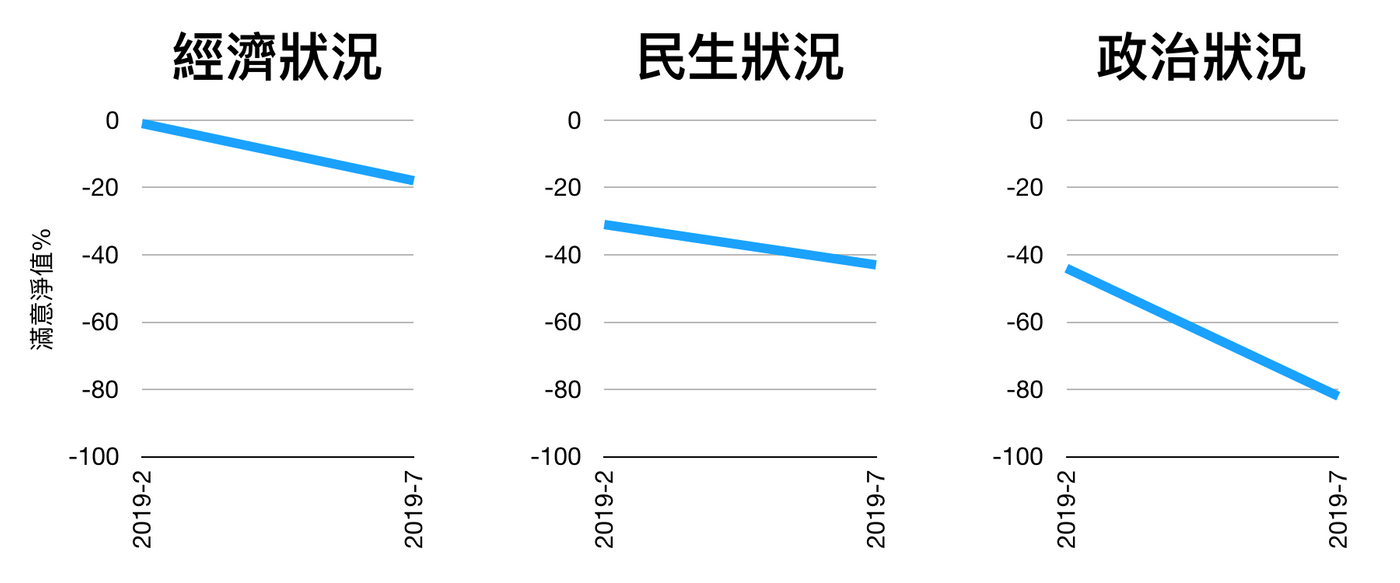
The second survey also came from the Hong Kong Public Opinion Research Institute. The survey was conducted in late July and successfully interviewed 1,007 Hong Kong citizens. At the 95% confidence level, the error did not exceed +/-3%. The survey focused on asking citizens how they felt about the movement. First of all, 69% of the respondents oppose the revision of the Fugitive Offenders Ordinance, and only 19% support it. Public opinion is obviously not on the side of the government. When asked "why young people are dissatisfied", 81% thought it was because they did not trust the central government, and 75% thought it was because they did not trust one country, two systems; as for the housing problem, only 58% thought it was because of the economic environment. of only 48%. These data tell us once again that the focus of public outrage is really politics. It is a completely wrong interpretation to think that young people are just taking advantage of this incident to vent their dissatisfaction because of housing or financial problems.
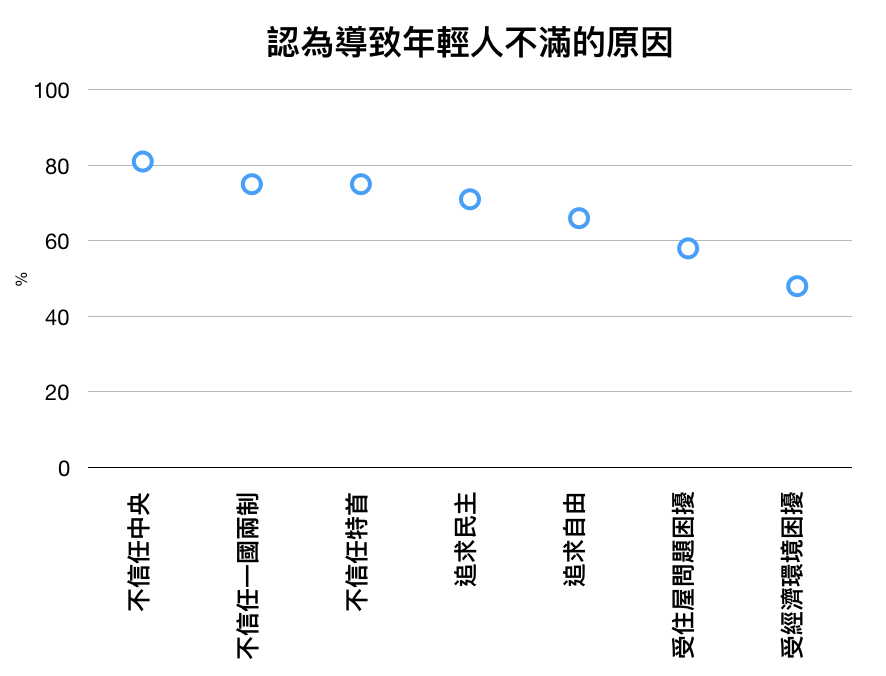
This is not to say that Hong Kong does not have housing or economic problems, these problems are serious. But the interpretation of Hong Kong's housing or economic problems by mainland Chinese public opinion often falls into a blind spot: completely ignoring the political underpinnings of these problems.
For example, property prices in Hong Kong are unbelievably expensive, and it is out of reach for young people to buy a home. Friends who have been to Hong Kong, it is not difficult to find that Hong Kong does not lack land, especially near Shenzhen, there is still a lot of land that has not been effectively used. It's a pity that when they get here, those comments who think they understand Hong Kong will go in the wrong direction. They will blame the young people in Hong Kong who only know how to make trouble, and would rather talk about environmental protection than develop land. What is the truth? The truth is far more complicated. Young people in Hong Kong do oppose reclamation and the development of country parks because they support environmental protection, but the land near Shenzhen has nothing to do with these two development models, but belongs to "brown soil", that is, the land that has been destroyed , such as recycling yards, open warehouses, and junk yards. To develop these lands, young people in Hong Kong are not opposed to it at all, and are even more supportive. So why are these lands not being developed? Then there is politics.
The Chief Executive of Hong Kong is not elected by one person, one vote, but by a committee of 1,200 people. These 1,200 people do not correspond to the composition of Hong Kong society at all. For example, there are 60 representatives in the fishing and agricultural sector, which has long since faded away, but only 30 representatives in the education sector, which consists of more than 80,000 primary and secondary school teachers. The reason behind such an unreasonable representation ratio is simple: it is convenient for the central government to manipulate election results. Any sector that is easily manipulated will be disproportionately represented.
But doing so brings a serious problem: the Hong Kong government is easily kidnapped by interest groups and cannot implement policies that are truly beneficial to people's livelihood. The interests of the "brownfields" mentioned above are in the hands of the indigenous residents of the New Territories, and they hold seats on the Election Committee, so no matter who is the Chief Executive, no one dares to touch them. In this case, the housing issue in Hong Kong is of course an economic and people's livelihood issue, but in the final analysis it is a political issue. Young people in Hong Kong have long seen this, so they directly demand political reform. They know that without political reform, any promise to improve people's livelihood will not be fulfilled. In mainland China, it is common for public opinion to criticize young people in Hong Kong for only "doing things" and not concentrating on economic development. This is completely out of ignorance of the actual situation in Hong Kong, and they unconsciously become lobbyists for those with vested interests.
"Condemn any violence" is tantamount to supporting illegal violence
The second type of misunderstanding I call "anti-violence theory." Those who hold this view will not pay attention to the specific demands of the protesters. As soon as they see the use of violence by the protesters, they will immediately and completely deny the protesters. In fact, the force used by all parties has been escalating in the past month, providing a lot of "evidence" for those who advocate "anti-violence" to criticize the protesters. Another similar statement is to oppose all illegal acts, arguing that no matter how noble the protesters' demands, as long as they violate the law, it is wrong.
If we were to live in a perfect world, I would agree with the "anti-violence theory". Unfortunately, our world is not perfect. The standard of justice should never be sufficient to judge whether it is illegal or not, or that violence is not violent. Injustices in the world, from slavery to genocide, are often carried out under the guise of "law", and those who resist are breaking the law. Obviously, in order to judge the right or wrong of a thing, it is impossible to just look at whether it is illegal or not, or whether violence is not violent, but also understand the situation itself.
The current situation of escalating violence in Hong Kong's protests is largely attributable to the violent incident in Yuen Long on July 21. That night, a large number of gang members dressed in white chased and beat passers-by at Yuen Long Station (there are some claims in mainland China that it was protesters who were beaten, and the protesters provoked them first. These claims are completely distorted facts. Lots of instant clips) They recorded their indiscriminate attacks on passers-by and journalists, including pregnant women on their way home). The problem is that these people in white did not appear suddenly. There were multiple channels the day before that there would be incidents that night, and a large number of people in white had gathered two hours before the attack that night. The strange thing is that after the men in white attacked, the police did not arrive at the scene until thirty-nine minutes later; what was even more strange was that the police left without arresting anyone; what was even more strange was that the men in white returned to the scene for the second round. Attack; even more strange, the police still did not arrest anyone after that, but were photographed by the media as they escorted the man in white away very kindly. The next day, the city was outraged, and the police arrested a few people in white, charged them with minor crimes, and allowed them to leave on bail.

Relatively speaking, there is a huge contrast between the ferocity of the police against the demonstrators and the leniency of the people in white.
It is probably impossible to explain here the various indiscriminate violence of the police in the past two months. In general, the serious unprofessional law enforcement by the Hong Kong police is outrageous. For example, the police repeatedly fired tear gas at peaceful people who had legally applied for a rally, and at demonstrators who were retreating during the clashes. It should be noted that the police have stated in the Legislative Council that tear gas can only be fired when "to deal with the crowd that may cause the scene to get out of control and create danger, or to stop and prevent the crowd from continuing to attack the police line of defense". In other words, it is actually the Hong Kong police who do not follow the rules. Speaking of the rules, the police regulations stipulate that the police should indicate the number when the public makes inquiries, so that the public can supervise. But for the past two months, the police kept refusing to show the warrant card and serial number without a reasonable explanation. Are these practices designed to allow the police to enforce the law effectively? Just last night, a neighborhood in Tseung Kwan O was beaten to death by the police. Theoretically, only a criminal suspect could be beaten, but as a result, the police did not arrest him afterwards, nor did they even do the most basic investigation; in other words, the neighbor was beaten for nothing.
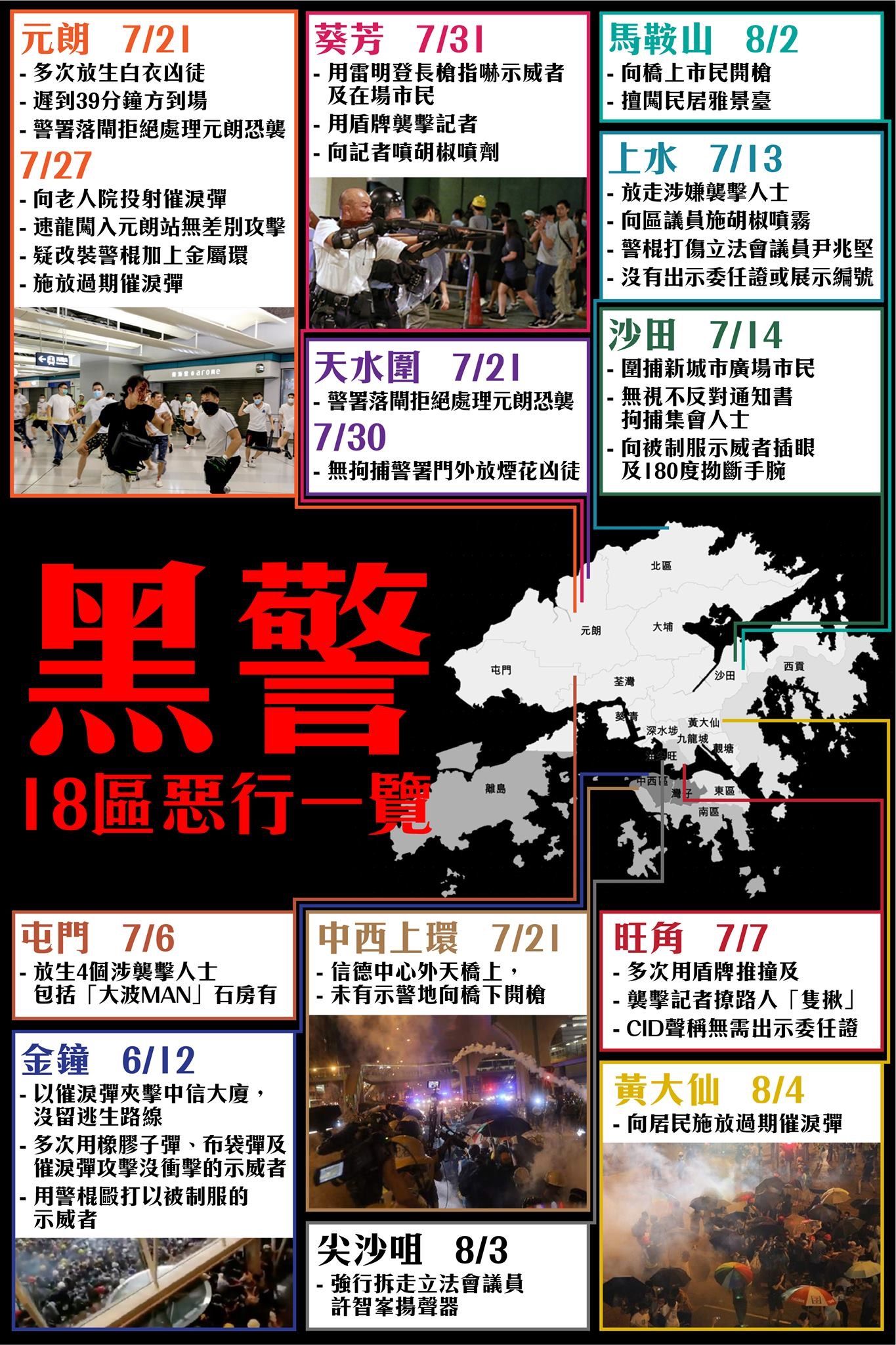
Against this background, many young people feel that they have nowhere to go, so they decide to use their own methods to retaliate against the police, such as taking the initiative to attack the police station. I don't quite agree with these actions, but at the same time, I really can't think of any other way to tell them that the police would be held accountable for their brutality. From a macro perspective, it is only after the various solutions in Hong Kong's system (whether it is the government, parliament, courts, media, and civil society) have rotted one by one, so many people are forced to use solutions outside the system. . There is no room here to explain how these systems are rotten, please refer to "Hong Kong Lesson 1".
Strictly speaking, the initiators of the opposition movement in Hong Kong have turned into a police mutiny and the citizens' resistance to the police mutiny. Why betrayal? Going back to the July 21 attack by the men in white, the Chief Secretary for Administration, Cheung Kin-chung, later apologized to the public for this. Who knows, as soon as he apologized, a large number of anonymous letters with the back of the police warrant card appeared on the Internet, scolding the Chief Secretary for Administration; representatives of the Police Association also showed up to protest. It is known that the immediate supervisor of the police is the Commissioner of Police, the supervisor of the Commissioner of Police is the Secretary for Security, and the supervisor of the Secretary for Security is the Chief Secretary for Administration. In other words, these police officers are blatantly attacking their superior's superior's superior. This kind of behavior, a serious violation of discipline, would be called mutiny in a normal government. It's just that the vast majority of Hong Kong people no longer trust the government, and the government feels that police violence is their last foundation of governance, so the police have no fear, and indiscriminate violence has escalated.
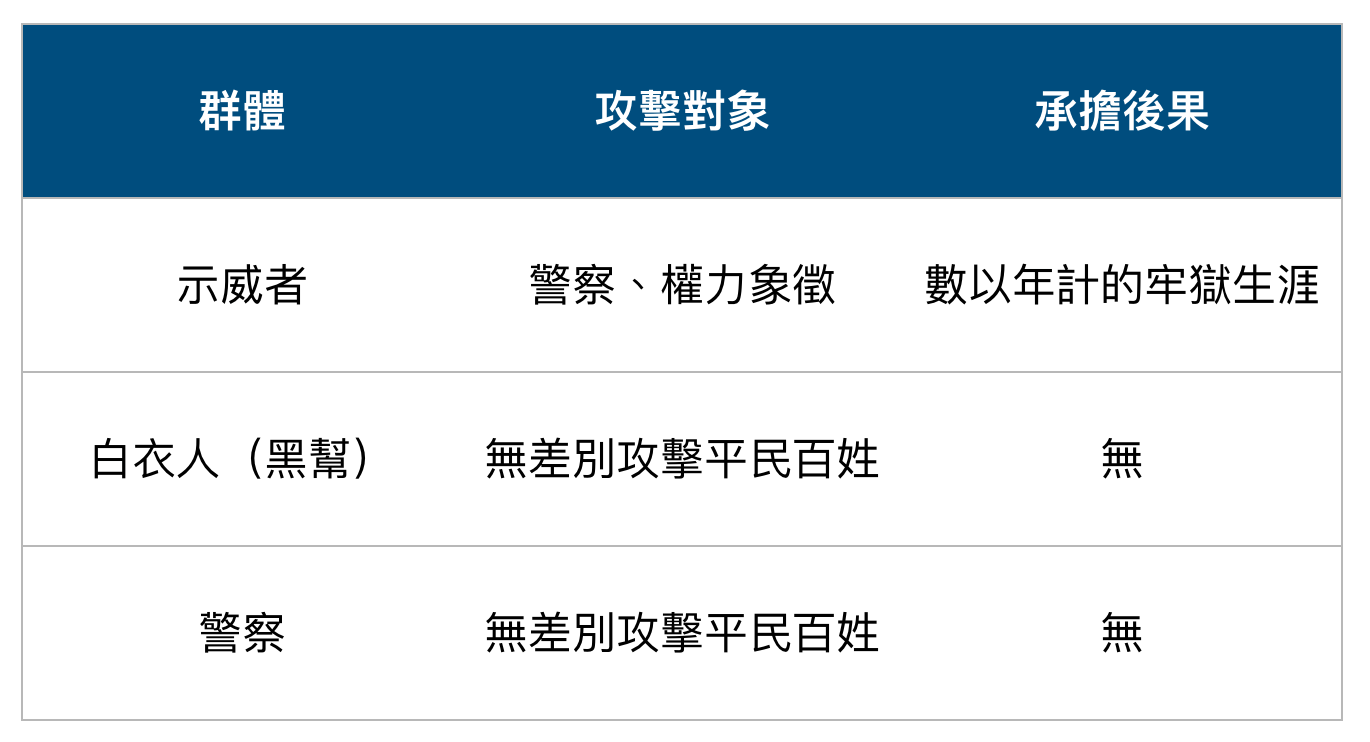
Going back to those sayings of "condemning any violence", we have to understand that Hong Kong now has not only the violence of the demonstrators, but also the violence of the men in white, and the indiscriminate violence of the police. Among the three types of violence, both the white clothes and the police deal with the civilians indiscriminately, while the demonstrators only target those in power; among the three types of violence, neither the white clothes nor the police are responsible for their violence. Instead, protesters have to face years in prison as the price. With such an unequal premise, the statement "condemn any violence" ignores the fact that the violence of the demonstrators is caused by the violence of the white clothes and the police. To stop this vicious cycle, the people in white must first be brought to justice, and the police's indiscriminate violence must be punished. Any responsible media should focus more on the violence of the white clothes and the police than the force of the demonstrators. On the contrary, I found that those who "condemned any violence" would end up only targeting the force of the demonstrators, but not talking about the issue of white clothes and the police at all. To "condemn any violence" in this way is hypocrisy at the end of the sentence.
Misjudgment will bring disaster to the country and the people
Finally, I would like to point out that Hong Kong people are not fools. Many mainland Chinese public opinion regards the participants in the Hong Kong movement as naive children who are probably instigated by external forces. This is another serious misreading.
Let's see, how things have developed to this day, who else is on the side of the demonstrators? Former CUHK President Sung Tsu-yao, world-renowned infectious disease expert Professor Yuan Guoyong, more than 30 former senior government officials (including former Civil Service Bureau chiefs Wang Yongping and Yu Zongyi, former Director of Housing Department Miao Xueli, etc.), as well as the Hong Kong General Chamber of Commerce, several Inexhaustible professional groups, even the most senior civil servant ranks within the government have issued joint statements. These people are the mainstays of society, and it is impossible that they are all fools, and it is even less likely that they are all instigated by external forces. They all stood up, but Carrie Lam still refused to listen. It would be a serious misjudgment if we were to put the blame for the stalemate on the demonstrators.
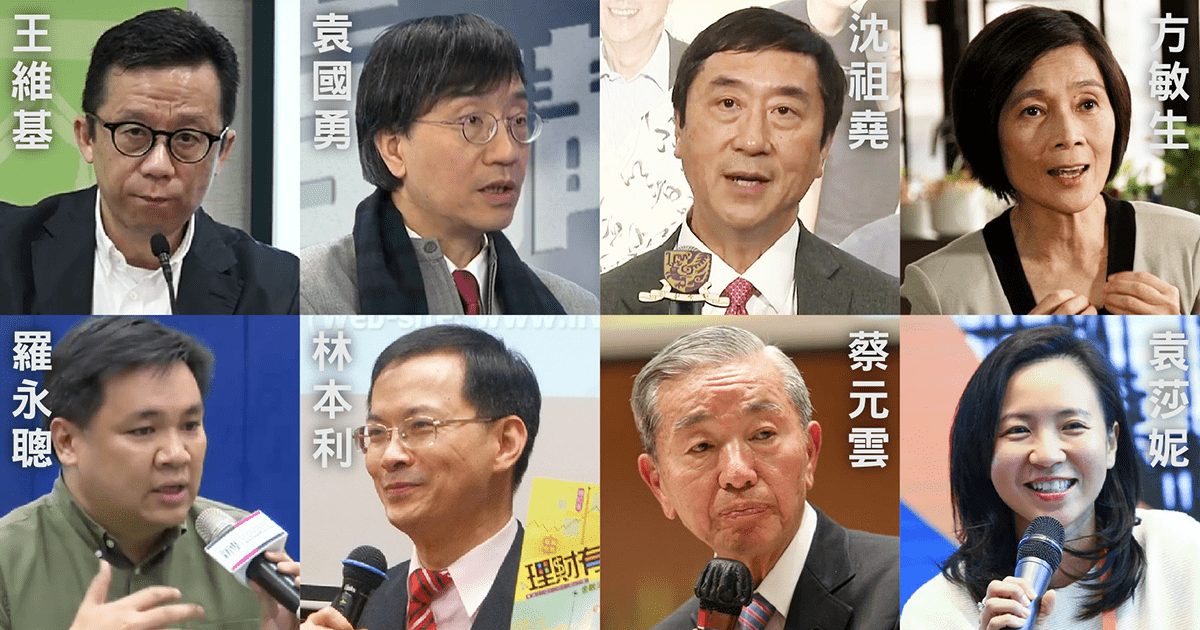
I hope that the central government will not make its policy towards Hong Kong based on these serious misjudgments. Otherwise, it will inevitably bring about a greater backlash and create more unnecessary contradictions. To recognize the problem, in order to solve the problem. As long as we don't deceive ourselves, things are actually quite clear.
Like my work?
Don't forget to support or like, so I know you are with me..
Comment…